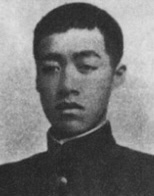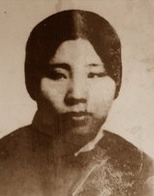Lin Jue Min’s farewell letter to his wife, written on a handkerchief, three days before the failed uprising against the Qing Government in 1911. He was 24 years old, one of Sun Yat-Sen’s revolutionaries. I have attempted a translation.
— T. Tang, 2011
意映卿卿如晤:
吾今以此書與汝永別矣!吾作此書時,尚為世中一人;汝看此書時,吾已成為陰間一鬼。 吾作此書,淚珠和筆墨齊下,不能書竟,而欲擱筆。 又恐汝不察吾衷,謂吾忍舍汝而死,謂吾不知汝之不欲吾死也,故遂忍悲為汝言之。
吾至愛汝!即此愛汝一念,使吾勇於就死也!吾自遇汝以來,常願天下有情人都成眷屬,然遍地腥雲,滿街狼犬,稱心快意,幾家能夠?司馬青衫,吾不能學太上之忘情也。 語雲,仁者“老吾老以及人之老,幼吾幼以及人之幼”。 吾充吾愛汝之心,助天下人愛其所愛,所以敢先汝而死,不顧汝也。 汝體吾此心,於悲啼之余,亦以天下人為念,當亦樂犧牲吾身與汝身之福利,為天下人謀永福也。 汝其勿悲。
汝憶否四五年前某夕,吾嘗語曰:“與使吾先死也,無寧汝先吾而死。” 汝初聞言而怒,后經吾婉解,雖不謂吾言為是,而亦無辭相答。 吾之意蓋謂以汝之弱,必不能禁失吾之悲,吾先死留苦與汝,吾心不忍,故寧請汝先死,吾擔悲也。 嗟夫,誰知吾卒先汝而死乎!
吾真不能忘汝也!回憶后街之屋,入門穿廊,過前后廳,又三四折有小廳,廳旁一室為吾與汝雙棲之所。 初婚三四個月,適冬之望日前后,窗外疏梅篩月影,依稀掩映,吾與汝並肩攜手,低低切切,何事不語,何情不訴!及今思之,空余淚痕!又回憶六七年前,吾之逃家復歸也,汝泣告我:“望今后有遠行,必以告妾,妾願隨君行。” 吾亦既許汝矣。 前十余日回家,即欲乘便以此行之事語汝,及與汝相對,又不能啟口;且以汝之有身也,更恐不勝悲,故惟日日呼酒買醉。嗟夫!當時余心之悲,蓋不能以寸管形容之。
吾誠願與汝相守以死。 第以今日事勢觀之,天災可以死,盜賊可以死,瓜分之日可以死,奸官污吏虐民可以死,吾輩處今日之中國,國中無地無時不可以死!到那時使吾眼睜睜看汝死,或使汝眼睜睜看我死,吾能之乎!抑汝能之乎!即可不死,而離散不相見,徒使兩地眼成穿而骨化石,試問古來幾曾見破鏡能重圓,則較死為苦也。 將奈之何?今日吾與汝幸雙健;天下人人不當死而死,與不願離而離者,不可數計;鐘情如我輩者,能忍之乎?此吾所以敢率性就死不顧汝也!吾今死無余憾,國事成不成,自有同志者在。 依新已五歲,轉眼成人,汝其善撫之,使之肖我。 汝腹中之物,吾疑其女也,女必像汝,吾心甚慰;或又是男,則亦教其以父志為志,則我死后,尚有二意洞在也,甚幸甚幸!
吾家后日當甚貧,貧無所苦,清靜過日而已。
吾今與汝無言矣!吾居九泉之下,遙聞汝哭聲,當哭相和也。 吾平日不信有鬼,今則又望其真有。 今人又言心電感應有道,吾亦望其言是實,則吾之死,吾靈尚依依旁汝也,汝不必以無侶悲!
吾生平未嘗以吾所志語汝,是吾不是處。 然語之,又恐汝日日為吾擔憂。 吾犧牲百死而不辭,而使汝擔憂,的的非吾所忍。 吾愛汝至,所以為汝謀者惟恐未盡。 汝幸而偶我,又何不幸而生今日之中國!吾幸而得汝,又何不幸而生今日之中國,卒不忍獨善其身!嗟夫!巾短情長,所未盡者尚有萬千,汝可摹擬得之。 吾今不能見汝矣!汝不能舍吾,其時時於夢中尋我乎!一慟!
辛亥三月念六夜四鼓,意洞手書。
家中諸母皆通文,有不解處,望請其指教。 當盡吾意為幸!
Lin was captured and executed after the failure of the uprising. His entire family went into hiding in a dilapidated house on the outskirts of Fuzhou. Members of the revolution came to visit them with news. One day, while Lin’s mother was cleaning, she found something stuffed in a crack of the door. It proved to be his letter to his wife, and a note to his father:
不孝兒覺民叩稟,父親大人,兒死矣,惟累大人吃苦,弟妹缺衣食耳,然大有補於全國同胞也,大罪乞恕之
“From your recalcitrant son Jue Min, with respect: My father, I am now dead. I regret bringing suffering upon you, and hardship on my brothers and sisters. But, on balance, it is for the greater good of our entire country. I beg your forgiveness for the enormity.”
To ease the sadness of Lin’s wife Chen Yi Ying, Lin’s brother gave his little daughter to her, to be a comfort — a daughter for a lost husband. When Chen gave birth, “the life in your belly” proved to be a boy. She died when the boy turned two years old, from a deep sadness, it was said. The post-revolution government found the child, and took good care of him. He was sent through college, and given a government post. He took little interest in politics and, unlike his father, lived a quiet life to the end. He passed away in 1983, survived by a son and two daughters.
Lin took part in the last unsucessful attempt to overthrow the Qing government. In October of the same year, 1911, the Xinhai revolution broke out all over China. This time, the regional armies of China mutinied against the central government. The last emperor, Pu Yi, abdicated early the following year. Some inferred that the Yellow Flower Hill uprising was the last catayst needed.
Lin was one of the “72” interred in the mausoleum at Huang Hua Gang. He would have been familiar with the old poem about those sent to the court of the first emperor, to try to end his reign, “while the shrill wind sang, over the cold water of the River Yi.”

